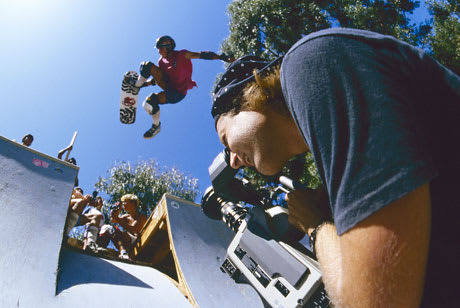After the highly successful Dogtown and Z-Boys reintroduced the world to the history of modern skateboarding and painted an indelible picture of late '70s Southern California, Stacy Peralta was bound to return to the same backyard pools and vert ramps to finish the story.
Bones Brigade: An Autobiography picks up where Dogtown left off, following Peralta's move from competition to marketing, focusing on the six most prominent members of Peralta's loosely organized "Bones Brigade" skate team: Lance Mountain, Tony Hawk, Mike McGill, Tommy Guerrero, Steve Caballero and Rodney Mullen. While this de facto sequel successfully follows a similar formula as Dogtown, the end result is a film that's considerably more personal.
The Bones Brigade was a group of handpicked prodigies – humble, goofy, intelligent kids – that Peralta could shape into athletes that would dominate professional skating for decades to come. While Stacy's wards all came from different backgrounds and parts of the country, they all shared one thing in common: an absolutely pathological need to ride around on a skateboard for as many hours a day as humanly possible. Much in the same way as its predecessor, Bones Brigade reveals its subjects as master innovators in the sport, literally inventing a new language to accommodate the new tricks they were pulling out of their Vans on a regular basis.
The details of these innovations are best left to the film to reveal but the most significant was the invention of the skateboard video, which exponentially increased the audience for a sport that was in severe danger of being ghettoized. The personalities suddenly came alive, adding depth and humanity to what had mostly been limited to pictures in magazines.
It's this aspect of a changing skateboard culture that the film uses as a springboard for the Bones Brigade members to psychologically explore each other, wherein Bones Brigade becomes a deeply personal and truly great film. Unlike many sports documentaries, Bones Brigade doesn't stop short at simply presenting greatness, but rather delves deep into its subjects to extrapolate why they achieved greatness. Each of the film's subjects reveal themselves in extraordinary ways and it is the story of Rodney Mullen, who at first seems fragile, but winds up being utterly profound, which hits the hardest.
As revealing and entertaining as Dogtown, Bones Brigade is also altogether more contemplative and the result is pure cinematic catharsis.
(Nonfiction Unlimited)Bones Brigade: An Autobiography picks up where Dogtown left off, following Peralta's move from competition to marketing, focusing on the six most prominent members of Peralta's loosely organized "Bones Brigade" skate team: Lance Mountain, Tony Hawk, Mike McGill, Tommy Guerrero, Steve Caballero and Rodney Mullen. While this de facto sequel successfully follows a similar formula as Dogtown, the end result is a film that's considerably more personal.
The Bones Brigade was a group of handpicked prodigies – humble, goofy, intelligent kids – that Peralta could shape into athletes that would dominate professional skating for decades to come. While Stacy's wards all came from different backgrounds and parts of the country, they all shared one thing in common: an absolutely pathological need to ride around on a skateboard for as many hours a day as humanly possible. Much in the same way as its predecessor, Bones Brigade reveals its subjects as master innovators in the sport, literally inventing a new language to accommodate the new tricks they were pulling out of their Vans on a regular basis.
The details of these innovations are best left to the film to reveal but the most significant was the invention of the skateboard video, which exponentially increased the audience for a sport that was in severe danger of being ghettoized. The personalities suddenly came alive, adding depth and humanity to what had mostly been limited to pictures in magazines.
It's this aspect of a changing skateboard culture that the film uses as a springboard for the Bones Brigade members to psychologically explore each other, wherein Bones Brigade becomes a deeply personal and truly great film. Unlike many sports documentaries, Bones Brigade doesn't stop short at simply presenting greatness, but rather delves deep into its subjects to extrapolate why they achieved greatness. Each of the film's subjects reveal themselves in extraordinary ways and it is the story of Rodney Mullen, who at first seems fragile, but winds up being utterly profound, which hits the hardest.
As revealing and entertaining as Dogtown, Bones Brigade is also altogether more contemplative and the result is pure cinematic catharsis.
